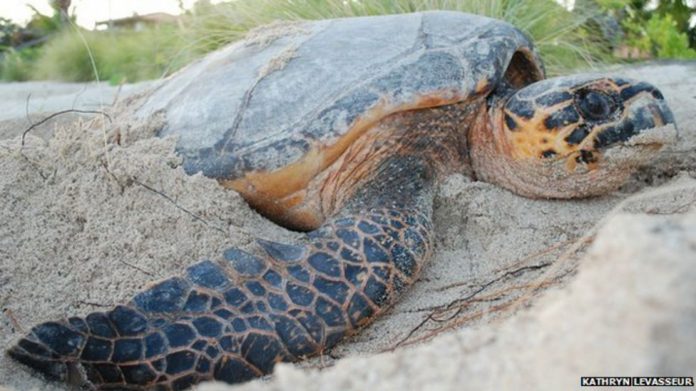By Carlena Knight
Residents are being cautioned that the capturing, killing and consumption of sea turtles is illegal.
The Director of the Antigua Marine Conservation Programme, Britney Hay, gave that reminder on Observer AM yesterday as she discussed the relaunch of a marine conservation programme.
Although there have not been any known incidents that have come to the fore recently, Hay said that much more can be done to preserve the endangered sea creatures.
“I do know that boat strikes are a problem, and turtles getting caught in fishing lines is still an issue because turtles need to breathe.
“So, when you leave out long lines and you catch them, they drown. When you strike a turtle, you are actually [killing] the turtle. You are not striking the shell; she is attached to the shell, so that’s just something that people need to be mindful of,” she warned.
“When you are entering bays like Galleon, I have seen people going in there at rapid speed but there are a lot of foraging turtles there – not to mention humans snorkelling. People really need to be mindful of those things and slow down,” Hay said.
The Antigua Marine Conservation Programme is a relaunch and an expansion of the Antigua Sea Turtle project which has monitored nesting beaches for about a decade.
With its relaunch, the group is looking at a more holistic approach to protecting the turtles that feed in the waters surrounding Antigua and Barbuda.
Hay, a former wildlife officer with the Environmental Awareness Group (EAG), explained the importance of such a programme.
“It’s kind of easy to get people excited about turtles because everyone loves turtles. They think they are so cute, but there is more to them than just that.
“They are really important for the ecosystem in general; they are nutrient transporters. They eat out at sea then they come onto land, and they contribute to the nutrients on land as well.
“They are always moving nutrients from the sea to the land when they come up to nest by laying eggs and, you know, those eggs contribute as well.
“Whether they are decaying in the sand or predators are eating the eggs, they are contributing to that nutrient cycle,” Hay explained.
Since its relaunch, the group has rolled out a sea turtle telephone hotline and is looking to conduct a national survey, starting next month, to get an idea of the nesting landscape around the island.
Training sessions for the surveyors began yesterday, and are geared towards educating individuals on the importance of sea turtle conservation, the correct ways to identify crawls, and when a hotline call may be required.
“They will be trained a little bit more intensely because they will be interacting with turtles.
“You have to let them know the dos and don’ts, as well as what to be familiar with, how to be prepared, and what type of engagement [there should be],” she added.
Hay revealed that there will also be increased monitoring around May when the nesting season swings into gear.
Residents who spot turtles are encouraged to call the hotline at 736-TURT (736-8878).

